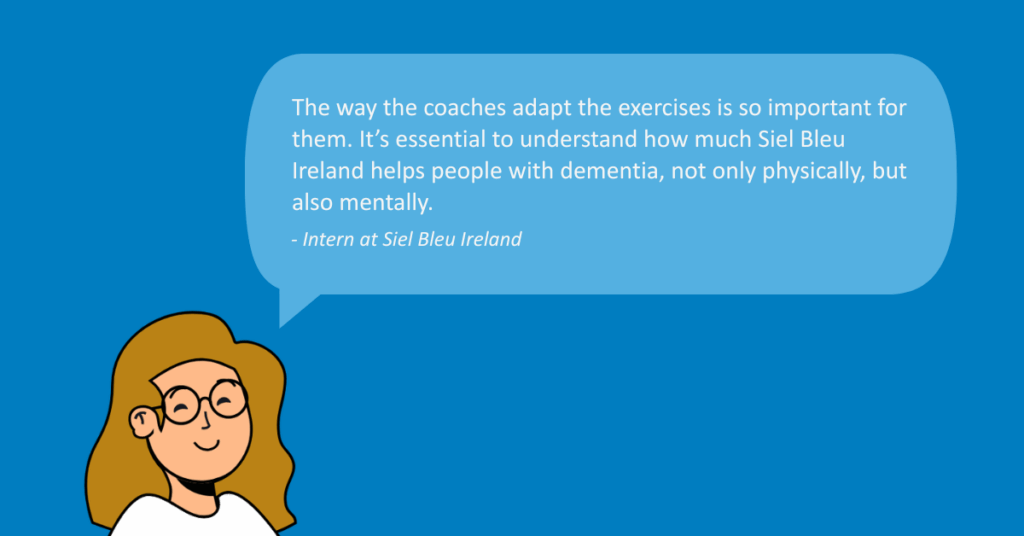Nowadays, people living in nursing homes have few opportunities to do physical activity. More than 80% of elderly people have a high level of sedentary behaviour, and this percentage is even higher in nursing homes. According to studies, to stay healthy, it is better to do at least 150 minutes of physical activity per week. However, many studies show that about 67.7% of people aged 60 and over do not follow the WHO recommendations.
These alarming numbers must change, because physical activity brings many health benefits, especially for older adults. It helps maintain muscle mass, which is important to stay active every day. It also improves balance, which reduces the risk of falling, something that happens often but can be prevented. But that’s not all: moving your body also helps prevent chronic diseases (like diabetes or heart problems) and strengthens the immune system, which helps fight infections.
In nursing homes, this is even more important because residents are often very fragile and inactive. Imagine these people spending hours sitting, without doing any movement. Faced with this hard reality, Siel Bleu, a non-profit organisation, supports these people to improve their health. They organise adapted sessions for each type of difficulty that older people may have, and they encourage them to do physical activities that suit their needs.
A Personalised, Professional, and Thoughtful Session with Dementia Patients
Some interns had the chance to attend a session with people suffering from dementia. The session started with a light warm-up that involved all the muscles in the body. The coach also did cognitive exercises to stimulate memory. For example, at the end of the session, she asked questions related to the information she had given at the beginning, helping the participants to use their memory.
This showed how well the exercises were adapted to the group. She also made the exercises more personal by giving the ball directly to each resident or speaking to them one by one. In this way, the exercises were individual and adapted to each person. She made sure never to give exercises that were too hard or not adapted. When needed, she gave another version of the exercise for those who couldn’t do the original one. This showed a professional and person-centred approach.
Intern-led exercises to Bring Energy to the group
The interns didn’t come empty-handed! They had prepared a game for the residents. One of them played volleyball and brought equipment to adapt her sport to the group. They managed to organise a volleyball match for the residents with a lower net and larger, softer balls. The game was simple: each resident sat on a chair, with a net between the two sides. There were two teams, one on the left and one on the right. The goal was to send as many balls as possible to the other side in 3 minutes.
The session was full of energy and happiness. The interns were really proud to organise this project!
At the end of the class, one intern said:
“The way the coaches adapt the exercises is so important for them. It is essential to understand how much Siel Bleu Ireland helps these people with dementia not only physically, but also mentally.”
This is why Siel Bleu tries to make its programmes available as early as possible, because prevention through sport is more effective when started soon. However, the organisation also faces challenges, especially when some patients have difficulties communicating or understanding instructions.
Surprisingly, with the help of health professionals and active participation from the residents, the interns managed to get people with dementia to move. This simple moment, made possible through teamwork, brought joy and laughter but also real benefits for the autonomy of the participants.
Teamwork Makes Movement Possible
This intergenerational experience proves that with some willpower and kindness, it is possible to improve the quality of life of the most fragile people. Of course, the challenge is complex because it involves human and technical difficulties. But this complexity should not stop us. On the contrary, it shows that every small action or initiative, even simple ones, can have a real and lasting impact. Helping vulnerable people is often seen as a difficult job for professionals only, but in reality, it’s something each of us can do.
This experience reminds us that, even in the face of fragility and challenges, taking action for the well-being of others is something everyone can do. We just need to dare to get involved, with empathy and perseverance.

